10 Top Greatest Athletes Of All Time According to Zohaib
You can send us your collection by going to ContactUs page.
Please be aware that the content within this list may be updated, modified, or revised in the future. As new information becomes available or circumstances evolve, the items or rankings within the list may be adjusted accordingly.
Note that the collection presented here has been contributed by an individual and every Individual has its own Opinion so it is not an official collection. While we strive to curate and provide high-quality content, the accuracy, completeness, and authenticity of the collection cannot be guaranteed. The views, opinions, and selection of items within this collection solely belong to the user who created it. We encourage you to explore and enjoy the collection with an open mind, understanding that it reflects personal preferences and perspectives. Should you have any questions or concerns, please feel free to reach out to us. Your feedback is valuable as we continuously strive to enhance your browsing experience
Created By: Zohaib
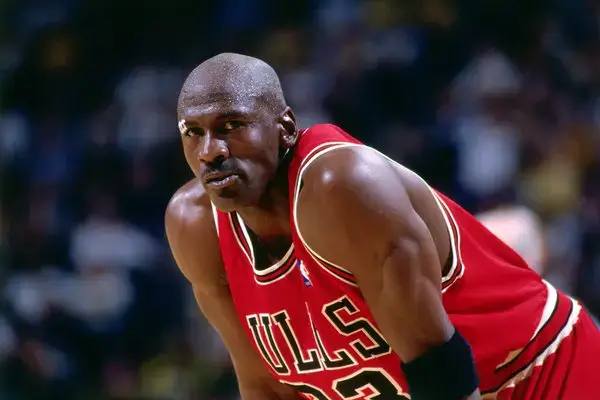
Michael Jordan
Introduction: Michael Jeffrey Jordan, born on February 17, 1963, in Brooklyn, New York, is widely regarded as one of the greatest basketball players of all time. Known for his incredible athleticism, competitive spirit, and clutch performances, Jordan became an icon both on and off the basketball court.
Early Life and College Success: Jordan's passion for basketball started at an early age. He played college basketball at the University of North Carolina and won the NCAA championship in 1982. His game-winning shot in the final against Georgetown is still remembered as one of the most iconic moments in college basketball history.
NBA Career with the Chicago Bulls: Michael Jordan was selected by the Chicago Bulls as the third overall pick in the 1984 NBA Draft. He quickly established himself as a dominant force in the league, earning the nickname "Air Jordan" for his awe-inspiring dunks and acrobatic plays.
Championship Success: With Jordan leading the way, the Chicago Bulls achieved unprecedented success in the 1990s. They won six NBA championships in the 1990s, with Jordan being named the NBA Finals MVP each time. His intense work ethic and will to win were unparalleled, making him a fierce competitor.
Individual Achievements: Michael Jordan's individual accolades include five regular-season MVP awards, 14 NBA All-Star selections, and ten scoring titles. He was known for his clutch performances and ability to elevate his game in crucial moments.
First Retirement and Baseball Stint: In a surprising move, Jordan retired from basketball in 1993 to pursue a career in baseball. He briefly played minor league baseball for the Birmingham Barons, a Double-A affiliate of the Chicago White Sox.
Comeback and Second Three-Peat: Jordan returned to the NBA in 1995 and resumed his dominance with the Bulls. He led the team to three more consecutive championships from 1996 to 1998, solidifying the Bulls' status as one of the greatest dynasties in sports history.
Second Retirement and Final Comeback: After the 1997-1998 season, Jordan retired for the second time. However, he made a brief comeback with the Washington Wizards in 2001 and played for two seasons before retiring for the final time in 2003.
Business Ventures and Influence: Beyond basketball, Michael Jordan became a successful businessman and owner of the Charlotte Hornets NBA team. He established the Jordan Brand, a subsidiary of Nike, which has become one of the most popular and successful lines of athletic shoes and apparel.
Legacy and Impact: Michael Jordan's influence extends far beyond his playing days. He has inspired a generation of basketball players and athletes with his skill, passion, and dedication to excellence. His impact on popular culture and global sports is immeasurable, and he remains a cultural icon to this day.
Conclusion: Michael Jordan's career is a testament to his unparalleled talent and determination. His contributions to the game of basketball, both on and off the court, have left an indelible mark on the sport and continue to inspire athletes worldwide. As a true legend, Michael Jordan's legacy will forever be etched in the history of basketball and sports.
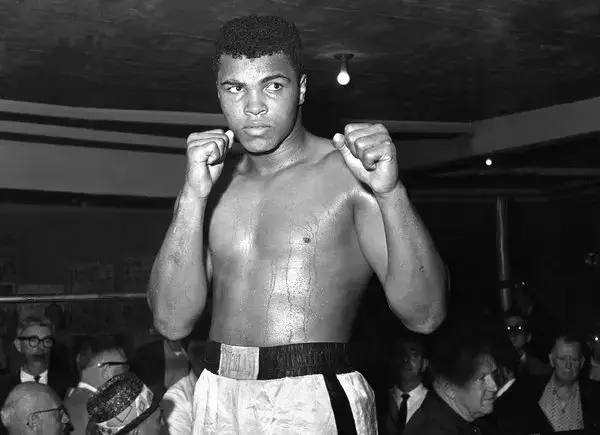
Muhammad Ali
Introduction: Muhammad Ali, born as Cassius Marcellus Clay Jr. on January 17, 1942, in Louisville, Kentucky, was one of the greatest professional boxers in history and a cultural icon.
Early Life and Boxing Beginnings: Ali's boxing journey began at the age of 12 when he started training at a local gym to learn how to defend himself. He quickly showed immense talent and won numerous amateur championships.
Olympic Gold Medal: In 1960, Ali represented the United States at the Rome Olympics, where he won the gold medal in the light heavyweight division. This victory marked the start of his legendary boxing career.
Professional Boxing Career: After turning professional, Muhammad Ali quickly rose through the ranks and earned a reputation for his dazzling footwork, lightning-fast jabs, and unorthodox fighting style. He became known for his outspokenness and charismatic personality, earning the nickname "The Louisville Lip."
World Heavyweight Champion: In 1964, at the age of 22, Ali won the world heavyweight title by defeating Sonny Liston in a stunning upset. He defended his title multiple times, engaging in iconic fights against rivals such as Joe Frazier, George Foreman, and Ken Norton.
Conscientious Objector and Suspension: Ali's refusal to be drafted into the U.S. military during the Vietnam War due to his religious beliefs as a Muslim led to his suspension from boxing and the stripping of his heavyweight title. He stood firm in his convictions, sacrificing the prime years of his career for his principles.
Comeback and Legacy: After a three-year hiatus, Ali returned to the ring and reclaimed the heavyweight title. He continued to fight against top contenders and became the first three-time world heavyweight champion in history.
The Thrilla in Manila and Rivalries: One of Ali's most legendary fights was "The Thrilla in Manila" against Joe Frazier in 1975. The bout is considered one of the greatest matches in boxing history. Ali's rivalries with Frazier and George Foreman captivated the world and solidified his status as a global sports icon.
Ali's Impact Beyond Boxing: Outside of the ring, Muhammad Ali was a civil rights activist and an influential figure in the fight for racial equality. His charisma, wit, and unwavering confidence transcended sports and made him a symbol of hope and inspiration for millions.
Later Life and Legacy: Ali retired from boxing in 1981 with a professional record of 56 wins, 5 losses, and 37 knockouts. He remained active in philanthropy and humanitarian work, promoting peace, religious tolerance, and humanitarian causes.
Passing and Global Mourning: Muhammad Ali passed away on June 3, 2016, at the age of 74, after battling Parkinson's disease for several years. His death sparked an outpouring of grief and tributes from people around the world, highlighting his profound impact on society.
Conclusion: Muhammad Ali's legacy extends far beyond his achievements in the boxing ring. He was a trailblazer, an advocate for civil rights, and a symbol of courage and conviction. His influence on sports, culture, and social justice continues to inspire people worldwide, making him a true legend in the annals of history.

Wayne Gretzky
Introduction: Wayne Gretzky, born on January 26, 1961, in Brantford, Ontario, Canada, is widely regarded as the greatest ice hockey player in history.
Early Life and Hockey Beginnings: Gretzky showed exceptional talent for hockey at a young age. He began playing organized hockey in his hometown and quickly rose through the ranks due to his remarkable skills and hockey IQ.
NHL Career: Gretzky made his National Hockey League (NHL) debut in 1979 with the Edmonton Oilers. He quickly established himself as a force to be reckoned with, setting numerous records and redefining the game. Known for his vision, passing ability, and goal-scoring prowess, he earned the nickname "The Great One."
Oilers Dynasty: With Gretzky leading the way, the Edmonton Oilers became a dominant force in the NHL during the 1980s. They won four Stanley Cup championships (1984, 1985, 1987, and 1988) and cemented their status as one of the greatest teams in hockey history.
Trade to the Los Angeles Kings: In a shocking move, Gretzky was traded to the Los Angeles Kings in 1988. The trade had a profound impact on hockey's popularity in the United States and helped grow the sport's presence in non-traditional markets.
St. Louis Blues, New York Rangers, and Retirement: Gretzky later played for the St. Louis Blues and the New York Rangers before retiring from professional hockey in 1999. Throughout his career, he shattered numerous records, including most goals, assists, and points in NHL history.
Legacy and Impact: Wayne Gretzky's influence on the sport of hockey is immeasurable. His records and accomplishments are unparalleled, and his style of play revolutionized the game. His jersey number 99 was retired league-wide by the NHL as a tribute to his contributions.
Post-Playing Career: After retiring, Gretzky continued to be involved in hockey as a coach and executive. He has also worked as a television analyst and served as a key ambassador for the sport.
Personal Life: Off the ice, Gretzky has been a devoted family man. He is married to actress and model Janet Jones, and they have five children together.
Conclusion: Wayne Gretzky's impact on ice hockey cannot be overstated. His extraordinary talent, leadership, and sportsmanship have left an indelible mark on the sport. Known for his humility and dedication, he remains a beloved figure in both the hockey community and beyond. Gretzky's legacy as "The Great One" will forever be celebrated as an inspiration to aspiring athletes and hockey fans worldwide.
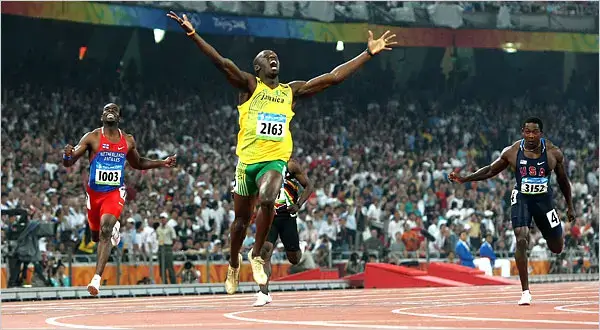
Usain Bolt
- Date of Birth: August 21, 1986
- Fastest Speed: 27.8 mph (44.72 km/h)
- Description: Usain Bolt, the fastest man in recorded history, is a Jamaican sprinter known for his incredible speed and dominance in the 100m and 200m sprints.
- Interesting Fact: Bolt has won numerous Olympic gold medals and holds multiple world records.
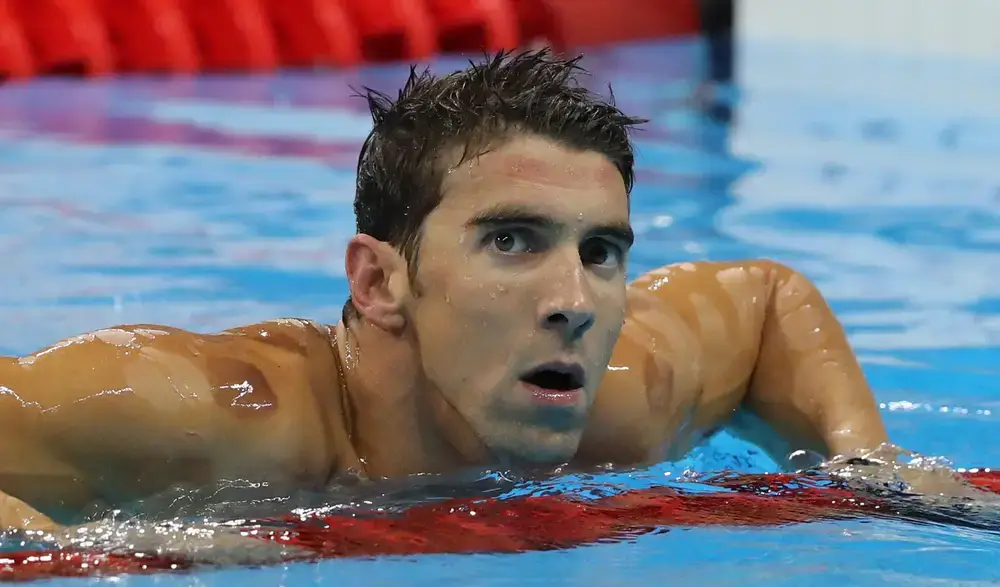
Michael Phelps
Introduction: Michael Phelps, born on June 30, 1985, in Baltimore, Maryland, is an American swimmer widely regarded as one of the greatest athletes in Olympic history.
Early Life and Introduction to Swimming: Phelps began swimming at a young age and quickly showed extraordinary talent in the sport. He joined the North Baltimore Aquatic Club, where he honed his skills and developed into a competitive swimmer.
Olympic Success: Phelps made his Olympic debut at the 2000 Sydney Olympics at the age of 15, becoming the youngest male swimmer to represent the United States in over 60 years. However, it was at the 2004 Athens Olympics that he truly made his mark, winning six gold and two bronze medals.
Record-Breaking Performances: At the 2008 Beijing Olympics, Phelps achieved unprecedented success, winning an astounding eight gold medals in a single Games, breaking the record set by Mark Spitz in 1972. His achievements included victories in individual events and relay races, showcasing his versatility and dominance in the pool.
London and Rio Olympics: Phelps continued to add to his medal tally at the 2012 London Olympics, winning four gold and two silver medals. He made a remarkable comeback at the 2016 Rio Olympics, securing five gold and one silver medal, further solidifying his status as an Olympic legend.
Retirement and Comeback: After the 2016 Olympics, Phelps announced his retirement from competitive swimming. However, he returned to the sport in 2020 for the Tokyo Olympics, marking his fifth Olympic appearance.
Philanthropy and Advocacy: Outside of the pool, Phelps is actively involved in philanthropy and advocacy work. He has been a vocal advocate for mental health awareness and has shared his own struggles with depression and anxiety to break the stigma surrounding mental health issues.
Personal Records and Achievements: Throughout his career, Phelps has set numerous world records and earned a total of 28 Olympic medals, including 23 gold medals, making him the most decorated Olympian of all time.
Legacy and Influence: Michael Phelps' impact on the sport of swimming and the Olympic movement is immeasurable. His dedication, work ethic, and unmatched success have inspired countless athletes worldwide to pursue their dreams in the pool.
Conclusion: Michael Phelps' remarkable career in swimming has left an indelible mark on the sport and the world of athletics. His extraordinary talent, record-breaking performances, and advocacy for mental health have made him an iconic figure in sports history and a role model for generations of aspiring swimmers.
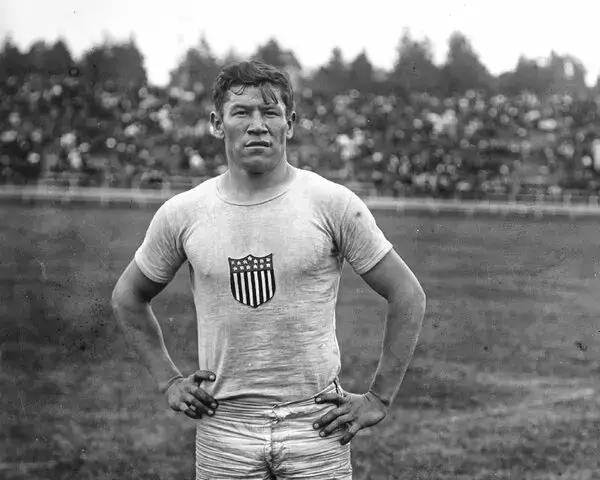
Jim Thorpe
Introduction: Jim Thorpe, born on May 28, 1887, in Prague, Oklahoma, was an iconic American athlete who excelled in multiple sports and left a lasting legacy in the world of sports.
Early Life and Athletic Talent: Thorpe's athletic talent was evident from a young age, and he participated in various sports during his school years. He attended the Carlisle Indian Industrial School, where he honed his skills and showcased remarkable abilities in track and field, football, and other sports.
Olympic Triumph: In 1912, Jim Thorpe represented the United States at the Olympic Games in Stockholm, Sweden. He won two gold medals, one in the pentathlon and another in the decathlon, demonstrating his versatility and dominance in track and field events.
Professional Football Career: Following his Olympic success, Thorpe played professional football for various teams, including the Canton Bulldogs, the New York Giants, and the Chicago Cardinals. He was known for his exceptional skills as a running back, kicker, and defensive player.
Baseball Career: Apart from football and track and field, Jim Thorpe also played professional baseball. He was a talented outfielder and played for several minor league teams.
Founding of the National Football League (NFL): Thorpe's contributions to professional football extended beyond his playing career. He was instrumental in forming the American Professional Football Association (APFA), which later evolved into the NFL, the premier professional football league in the world.
Struggles and Later Life: Despite his athletic prowess, Thorpe faced financial difficulties after his sports career. He took on various jobs to make ends meet, including acting and coaching.
Legacy and Recognition: Jim Thorpe's impact on sports and American culture cannot be overstated. He was a trailblazer for Native American athletes and set a standard of excellence in multiple sports. In 1950, the Associated Press named him the "Greatest Athlete of the First Half of the 20th Century."
Honors and Tributes: Numerous honors and tributes have been bestowed upon Jim Thorpe posthumously. The town of Mauch Chunk, Pennsylvania, renamed itself Jim Thorpe in 1954 and serves as his final resting place. The Jim Thorpe Award, presented annually to the best college defensive back in football, is another testament to his enduring legacy.
Conclusion: Jim Thorpe's exceptional athletic abilities, combined with his impact on professional football and American sports culture, have cemented his status as one of the greatest athletes of all time. His achievements continue to inspire generations of athletes, and he remains an influential figure in the annals of sports history.
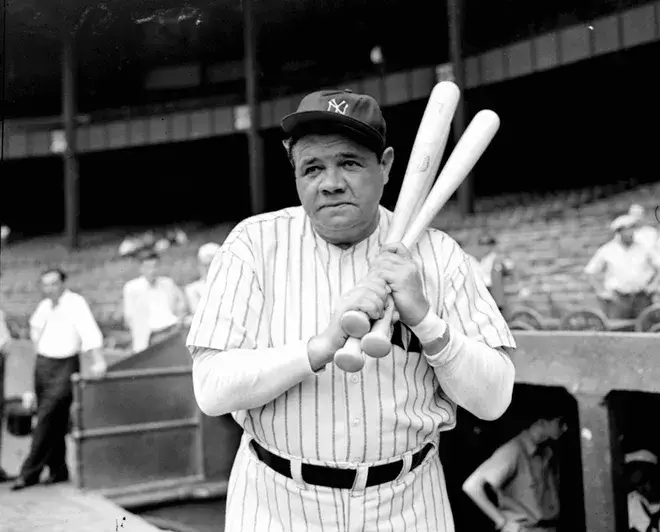
Babe Ruth
Introduction: Babe Ruth, born as George Herman Ruth Jr. on February 6, 1895, in Baltimore, Maryland, was an iconic American professional baseball player and one of the sport's greatest legends.
Early Life and Career Beginnings: Ruth's early life was marked by hardship, growing up in a poor family. He found solace and passion in playing baseball and was eventually signed by the Baltimore Orioles, a minor league team, at the age of 19.
Professional Career with the Boston Red Sox: Ruth's exceptional batting skills quickly caught the attention of major league teams. He was acquired by the Boston Red Sox in 1914 and became a dominant left-handed pitcher and a formidable hitter.
Impactful Transition to the New York Yankees: In 1920, Ruth was traded to the New York Yankees, marking a defining moment in baseball history. His move to the Yankees revolutionized the game and transformed the team into a powerhouse.
Home Run King and Record-Breaking Performances: Babe Ruth's most prominent attribute was his incredible power hitting, and he set records for home runs that stood for decades. He was the first player to hit 30, 40, 50, and eventually 60 home runs in a single season.
Cultural Icon and "The Sultan of Swat": Ruth's larger-than-life personality, charisma, and record-breaking performances earned him the nickname "The Sultan of Swat." He became a cultural icon during the Roaring Twenties and was adored by fans across America.
Legacy in Baseball: Babe Ruth's impact on baseball cannot be overstated. He revolutionized the game and brought popularity to the sport during his time with the Yankees. Ruth's legacy as a home run king and power hitter remains unmatched.
Enduring Records: Some of Babe Ruth's records have stood the test of time, and his influence on the sport continues to be felt. He held records for career home runs, slugging percentage, and on-base plus slugging (OPS) for many years.
Retirement and Later Life: Ruth retired from baseball in 1935 and briefly served as a coach and manager. He remained involved in the sport and continued to be a beloved figure in the baseball community until his passing on August 16, 1948.
Impact beyond Baseball: Beyond his achievements on the field, Babe Ruth's legacy extends to his impact on popular culture and his philanthropic efforts. He became a symbol of the American Dream and a beloved figure to people of all ages.
Conclusion: Babe Ruth's extraordinary career and larger-than-life persona have made him an immortal figure in the history of baseball. His records and impact on the game have left an indelible mark, and he remains an enduring symbol of greatness and sportsmanship in American sports history.

Lionel Messi
Introduction: Lionel Messi, born on June 24, 1987, in Rosario, Argentina, is a legendary Argentine professional footballer widely regarded as one of the greatest players of all time.
Early Life and Career Beginnings: Messi's passion for football was evident from a young age. He joined the youth ranks of FC Barcelona at the age of 13, where his exceptional skills quickly caught the attention of football fans and scouts.
Professional Career at FC Barcelona: Lionel Messi spent the majority of his professional career at FC Barcelona, where he achieved unparalleled success. With the club, he won numerous domestic and international titles, including multiple UEFA Champions League and La Liga titles.
Playing Style and Skills: Known for his incredible dribbling, close ball control, and precise finishing, Messi is renowned for his ability to score goals and create opportunities for his teammates. His vision, agility, and quickness on the pitch set him apart from other players.
Records and Achievements: Messi has shattered numerous football records throughout his career, including winning the prestigious Ballon d'Or award multiple times. He has scored a staggering number of goals, both for his club and country.
Argentina National Team: Messi has also represented the Argentina national team and has played in several FIFA World Cup and Copa America tournaments. In 2021, he led Argentina to victory in the Copa America, securing his first major international title with the national team.
Transition to Paris Saint-Germain (PSG): After spending over two decades at FC Barcelona, Messi joined Paris Saint-Germain (PSG) in 2021. His move to the French club marked a new chapter in his illustrious career.
Global Impact and Influence: Messi's influence extends beyond the football field. He is admired worldwide for his humility, sportsmanship, and charitable work. His remarkable career and persona have made him an icon across the globe.
Endorsements and Business Ventures: As one of the most marketable athletes, Messi has secured numerous lucrative endorsements and business partnerships, making him one of the highest-earning athletes in the world.
Legacy: Lionel Messi's legacy is one of greatness, sportsmanship, and dedication. He has left an indelible mark on the world of football and has inspired millions of aspiring players and fans around the globe.
Conclusion: Lionel Messi's journey from a young football prodigy in Argentina to becoming a global football icon is an extraordinary tale of talent, hard work, and perseverance. With his skill, records, and impact on and off the pitch, Messi's legacy as one of the all-time football greats is etched in history.
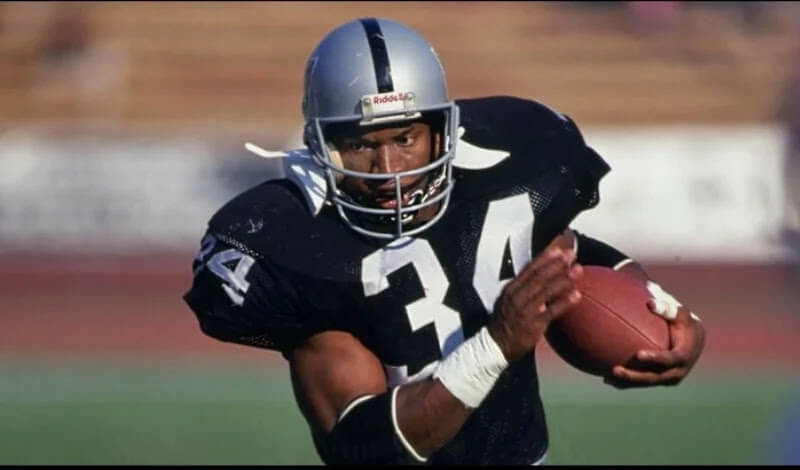
Bo Jackson
Introduction: Bo Jackson, born Vincent Edward Jackson on November 30, 1962, is a former American professional athlete who achieved remarkable success in both American football and baseball.
Early Life and College Sports: Born in Bessemer, Alabama, Jackson excelled in multiple sports from a young age. He attended Auburn University, where he became a star athlete in both football and baseball.
Professional Career in Football: Bo Jackson was selected as the first overall pick in the 1986 NFL Draft by the Tampa Bay Buccaneers. However, he opted to pursue a career in baseball instead.
Professional Career in Baseball: In baseball, Bo Jackson played as an outfielder for the Kansas City Royals, Chicago White Sox, and California Angels. Known for his immense power and speed, he became one of the most exciting players in the game.
Exceptional Athletic Abilities: Bo Jackson's rare combination of size, strength, and speed made him a force to be reckoned with in both football and baseball. He was renowned for his ability to break tackles and hit mammoth home runs.
Bo Knows Campaign: Bo Jackson's popularity skyrocketed with the "Bo Knows" marketing campaign, featuring his athletic prowess in various sports, showcasing his versatility and superstar status.
Hip Injury and Retirement: In 1991, Jackson suffered a career-ending hip injury while playing football. Despite the setback, he remained an iconic figure in sports history.
Legacy and Impact: Bo Jackson's legacy extends beyond his athletic achievements. He is often remembered as one of the greatest two-sport athletes of all time and an inspirational figure for athletes worldwide.
Cultural Icon: Bo Jackson's charisma and athleticism made him a cultural icon in the 1980s and 1990s. He transcended sports and became a symbol of excellence and athleticism.
Giving Back: Throughout his career and beyond, Bo Jackson has been actively involved in charitable work and community initiatives, showing his commitment to making a positive impact off the field.
Conclusion: Bo Jackson's extraordinary talent, captivating personality, and groundbreaking achievements in football and baseball have etched his name in sports history. He remains an enduring figure, cherished not only for his athletic accomplishments but also for his contributions to the community and his inspiration to generations of sports enthusiasts.
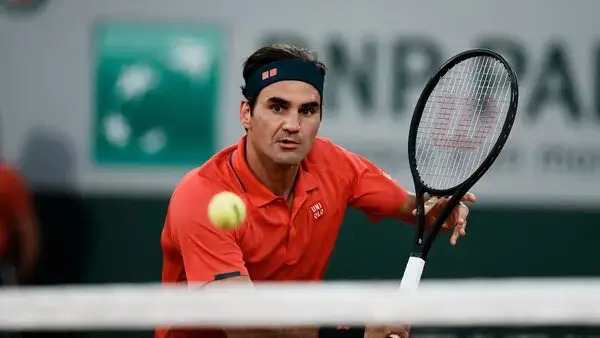
Roger Federer
Introduction: Roger Federer is a professional tennis player widely regarded as one of the greatest players in the history of the sport. He was born on August 8, 1981, in Basel, Switzerland.
Early Life and Tennis Beginnings: From a young age, Federer showed a keen interest and talent in tennis. He began playing the sport at the age of eight and quickly rose through the ranks of junior tennis in Switzerland.
Professional Career: Federer turned professional in 1998 and made his mark on the tennis world in the early 2000s. He has won numerous Grand Slam titles, including Wimbledon, the Australian Open, the US Open, and the French Open.
Playing Style and Achievements: Federer is known for his elegant and versatile playing style. His precise serve, powerful forehand, and exceptional shot-making ability have earned him praise from fans, fellow players, and tennis experts alike.
Records and Legacy: Throughout his illustrious career, Federer has set multiple records and achieved numerous milestones. He has held the world No. 1 ranking for an extended period and has won a record number of Wimbledon titles.
Sportsmanship and Philanthropy: Federer is not only admired for his on-court skills but also for his sportsmanship and gentlemanly conduct. He is actively involved in various charitable activities and has established the Roger Federer Foundation, which aims to improve education and provide opportunities for children in need.
Injuries and Comebacks: In recent years, Federer has faced challenges with injuries, but he has demonstrated remarkable resilience and made successful comebacks to the sport.
Global Fanbase: Federer's charisma and talent have earned him a massive global fanbase, making him one of the most beloved and marketable athletes in the world.
Family Life: Off the court, Federer is a devoted family man. He is married to former professional tennis player Mirka Federer, and they have four children together.
Inspiration and Sports Icon: Roger Federer's enduring success and contribution to tennis have made him an inspiration to aspiring athletes around the world. His impact on the sport and his dedication to making a positive difference in people's lives have solidified his status as a true sports icon.
Conclusion: Roger Federer's extraordinary tennis career, sportsmanship, and philanthropic efforts have left an indelible mark on the world of sports. As he continues to compete and make a difference, his legacy as one of tennis's all-time greats will undoubtedly live on for generations to come.










